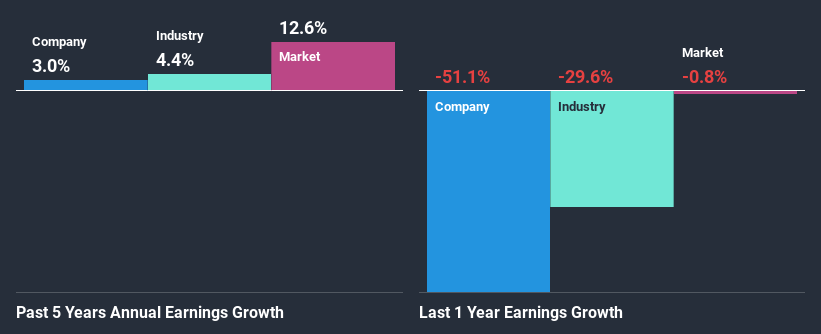Can Mixed Fundamentals Have A Negative Impact on MV Oil Trust (NYSE:MVO) Current Share Price Momentum?
MV Oil Trust (NYSE:MVO) has had a great run on the share market with its stock up by a significant 13% over the last month. However, we decided to pay attention to the company's fundamentals which don't appear to give a clear sign about the company's financial health. Particularly, we will be paying attention to MV Oil Trust's ROE today.
ROE or return on equity is a useful tool to assess how effectively a company can generate returns on the investment it received from its shareholders. In short, ROE shows the profit each dollar generates with respect to its shareholder investments.
Check out our latest analysis for MV Oil Trust
How Do You Calculate Return On Equity?
Return on equity can be calculated by using the formula:
Return on Equity = Net Profit (from continuing operations) ÷ Shareholders' Equity
So, based on the above formula, the ROE for MV Oil Trust is:
62% = US$7.0m ÷ US$11m (Based on the trailing twelve months to September 2020).
The 'return' is the income the business earned over the last year. One way to conceptualize this is that for each $1 of shareholders' capital it has, the company made $0.62 in profit.
Why Is ROE Important For Earnings Growth?
Thus far, we have learned that ROE measures how efficiently a company is generating its profits. Depending on how much of these profits the company reinvests or "retains", and how effectively it does so, we are then able to assess a company’s earnings growth potential. Assuming everything else remains unchanged, the higher the ROE and profit retention, the higher the growth rate of a company compared to companies that don't necessarily bear these characteristics.
A Side By Side comparison of MV Oil Trust's Earnings Growth And 62% ROE
To begin with, MV Oil Trust has a pretty high ROE which is interesting. Additionally, the company's ROE is higher compared to the industry average of 13% which is quite remarkable. However, for some reason, the higher returns aren't reflected in MV Oil Trust's meagre five year net income growth average of 3.0%. That's a bit unexpected from a company which has such a high rate of return. A few likely reasons why this could happen is that the company could have a high payout ratio or the business has allocated capital poorly, for instance.
As a next step, we compared MV Oil Trust's net income growth with the industry and were disappointed to see that the company's growth is lower than the industry average growth of 4.4% in the same period.
Earnings growth is an important metric to consider when valuing a stock. What investors need to determine next is if the expected earnings growth, or the lack of it, is already built into the share price. Doing so will help them establish if the stock's future looks promising or ominous. If you're wondering about MV Oil Trust's's valuation, check out this gauge of its price-to-earnings ratio, as compared to its industry.
Is MV Oil Trust Making Efficient Use Of Its Profits?
The high three-year median payout ratio of 95% (that is, the company retains only 4.6% of its income) over the past three years for MV Oil Trust suggests that the company's earnings growth was lower as a result of paying out a majority of its earnings.
In addition, MV Oil Trust has been paying dividends over a period of at least ten years suggesting that keeping up dividend payments is way more important to the management even if it comes at the cost of business growth.
Summary
In total, we're a bit ambivalent about MV Oil Trust's performance. While the company does have a high rate of return, its low earnings retention is probably what's hampering its earnings growth. Wrapping up, we would proceed with caution with this company and one way of doing that would be to look at the risk profile of the business. You can see the 2 risks we have identified for MV Oil Trust by visiting our risks dashboard for free on our platform here.
This article by Simply Wall St is general in nature. It does not constitute a recommendation to buy or sell any stock, and does not take account of your objectives, or your financial situation. We aim to bring you long-term focused analysis driven by fundamental data. Note that our analysis may not factor in the latest price-sensitive company announcements or qualitative material. Simply Wall St has no position in any stocks mentioned.
Have feedback on this article? Concerned about the content? Get in touch with us directly. Alternatively, email editorial-team@simplywallst.com.

